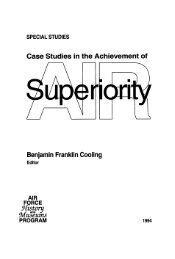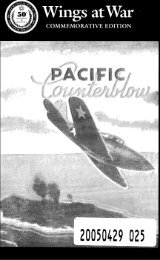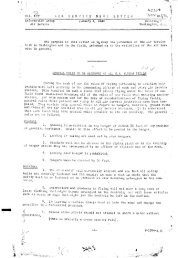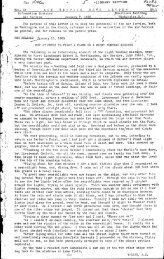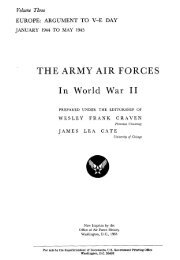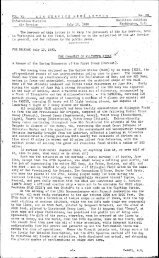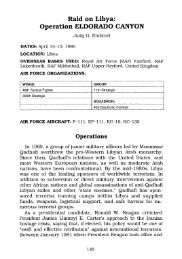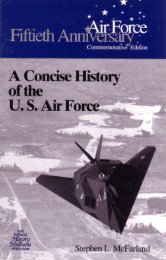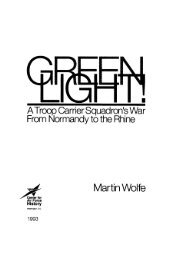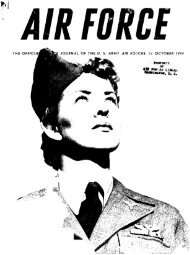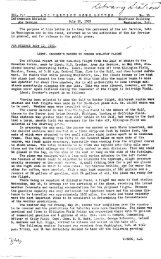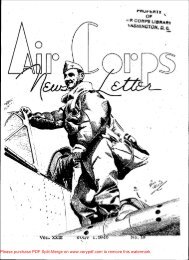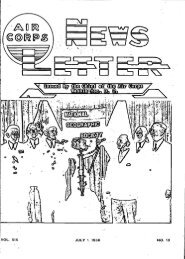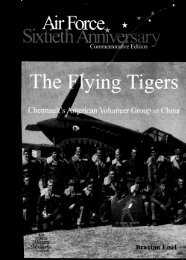News Letter 1941 Jul-Dec - Air Force Historical Studies Office
News Letter 1941 Jul-Dec - Air Force Historical Studies Office
News Letter 1941 Jul-Dec - Air Force Historical Studies Office
Create successful ePaper yourself
Turn your PDF publications into a flip-book with our unique Google optimized e-Paper software.
THE AIR FORCES NliWS LETTER<br />
has in use complete equipment for photostat developing<br />
and printing.<br />
The effectiveness of the Middletown plan is revealed<br />
by statistics. Early in <strong>1941</strong>, as the program<br />
started, the training staff worked day and<br />
night, building up course outlines and text books;<br />
selecting qualified instructors; and forming schedules.<br />
At the start of the expansion of the<br />
training effort, hundreds of new general mechanic<br />
helpers were being trained in basic principles of<br />
maintenance, besides somP. apprentices and a number<br />
of younger men assigned from the National Youth<br />
Administrat ion. By the end of Septerrber, <strong>1941</strong> the<br />
school had graduated a large nurrber of basically<br />
trained general mechanic helpers. The general<br />
plan was to allot 60% of each man's time to "onthe-job<br />
training" and 40% to formalized training<br />
in the individual's particular trade.<br />
It has been impossible to procure mechanics<br />
skilled in the trades used in the air depots since<br />
industry has already absorbed these men. Therefore<br />
it was necessary to employ people whose only<br />
recommendation was that they had worked at some<br />
trade for not less than six months. Fortunately<br />
there has been a steady supply of such men due to<br />
the fact that the repair depot lies in a great<br />
industrial complex, centering in Harrisburg (Dauphin<br />
county) and spreading outward over several<br />
adjoining countries. Here tt~re is a great backlog<br />
of available manpower. High selectivity was<br />
used as the training program was launched.<br />
Training Begins At Once<br />
Procedure for enter Lng the goverrurent's aircraft<br />
maintenance service (also true in the case of<br />
training for occupations in technical supply and<br />
administration) is much the same as governs entrance<br />
to employment in any federal bureau. About<br />
1500 candidates must be interviewed for 1200 vacancies.<br />
The mechanic is assigned to a section.<br />
His training begins at once. When it is discovered<br />
that a man does not have aptitude for training<br />
under an or iginal as signrrent , he is given a second<br />
change in another specialized field. If he is not<br />
suited for any type of aircraft work he is discharged.<br />
After about six months the trainee is eligible<br />
for promotion if his record is excellent. In half<br />
a year he has had about four months' formal training<br />
and two months' practical experience in the<br />
shop. When promoted he becomes a junior aircraft<br />
mechanic. When he is again promoted he becomes a<br />
journeyman mechanic.<br />
To record trainees' skill, knowledge, personality,<br />
and general aptitude, a comprehensive progress<br />
report ing system has been introduced in the form<br />
of a card index. A report of each student's work<br />
in the shop and in the c La s sro crn is made each<br />
month by his immediate supervisors. Introduced as<br />
a visual aid is a color-tab system which reveals<br />
at a glance the individual's current status. The<br />
system also shows the progress made in a whole department,<br />
or in a single trade, or under'one des<br />
ignat ion.<br />
Development Speed Important<br />
Speed of individual development is also important.<br />
The progress report shows this on a monthby-month<br />
basis. The color code for grading quality<br />
of performance is: blue, excellent; purple,<br />
good; orange, fair; red, unsatisfactory. When,<br />
for example, a sub-depot requires thirty trained<br />
mechanics for emergency or permanent ass ignment,<br />
the engineering officer can determine which men<br />
are qualified and available, in a very few minutes.<br />
Advancement to higher positions in other posts<br />
may be thought of as a function of "blueness" of<br />
record, although administrators consider fully<br />
other factors, such as whether transfer to a distant<br />
post in the control area would constitute a<br />
hardship for the individual or his family.<br />
Further, all of the men who have shown excellence<br />
in performance cannot be held ready for transfer.<br />
Some of them must be retained in order not to<br />
weaken the local production efficiency.<br />
Similar problems have arisen in the field of administration,<br />
especially with respect to the<br />
standardization and handling of records which<br />
could be expected to grow to massive proportions<br />
week by week. The officer appointed for this type<br />
of training has also been given command of a still<br />
unexecuted plan to establish a military college at<br />
the depot, where specialized officers may be<br />
trained. This school, like others to be founded<br />
at other posts, will be a sort of extension center<br />
for enlisted men considered for commissions. This<br />
phase of training is still in the explorative<br />
stage.<br />
Spec ia 1 Comme nda t ion<br />
So capable has conduct of the training program<br />
by officers at Middletown <strong>Air</strong> Depot been considered<br />
that spec ial commendat ion has recent ly been<br />
made by an expert consultant to the Secretary of<br />
War. An idea has grown to maturity and produced<br />
definite results in less than twelve months.<br />
\\'hatevf:rdefense needs of the future may be, the<br />
<strong>Air</strong> Corps' training section at Middletown is<br />
ready. This is the answer to a question that had<br />
to be answered in record time. Thousands of<br />
skilled mechanics trained at Middleto\l.n are already<br />
employed at bench, at engine, at lathe, in<br />
supply warehouses. In the months to come, thousands<br />
of others will go up to the line to work for<br />
national defense. This vast army of trained civilian<br />
technical experts will IHerE.!)), 'keep' em<br />
flying."<br />
18<br />
NUVl ...MlJl:R<br />
IV41



